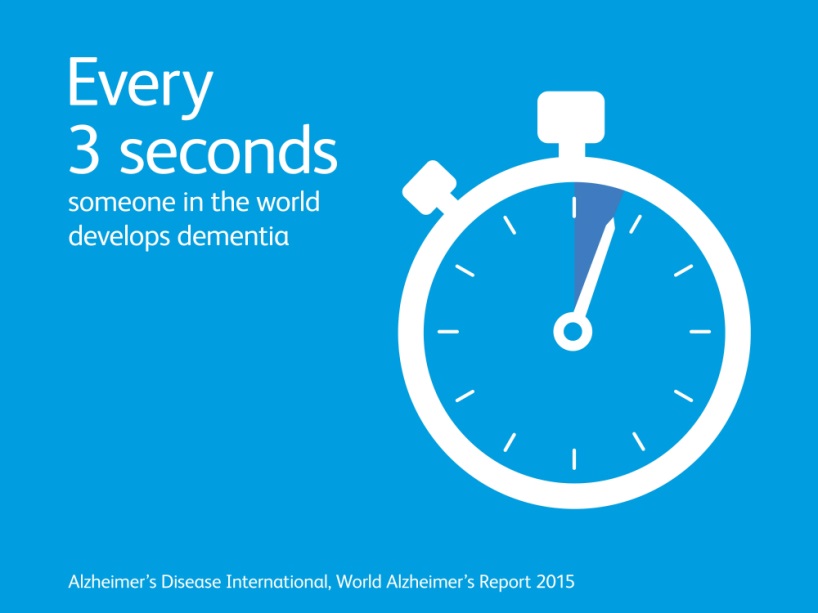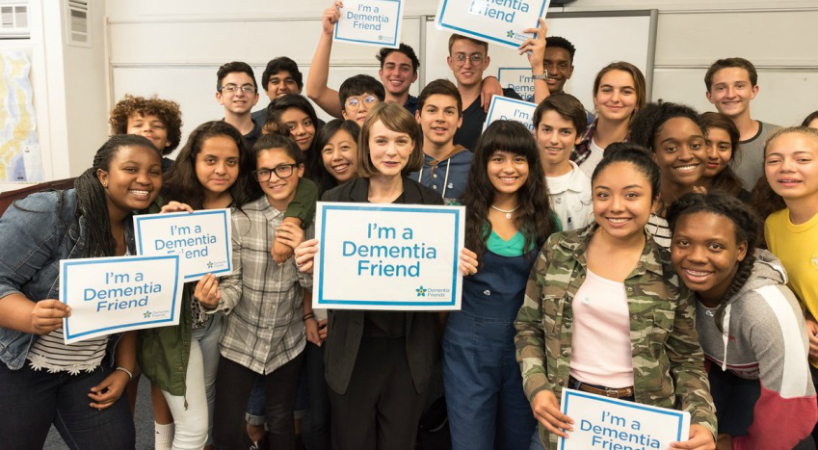Information
Challenging the stigma of dementia on World Alzheimer's Day
In the time it takes you to read this sentence, a new person will have developed dementia. Read about how we're raising awareness through World Alzheimer's Day.
At least 47 million people live with dementia worldwide and this number is growing by 9.9 million each year – the equivalent of a new case every 3 seconds or 27,123 over the course of yesterday’s World Alzheimer’s Day.

When we talk about new ‘cases’ we can easily forget the human side of dementia – a side that is often hidden behind closed doors.
It is also easy to ignore the stigma and discrimination that people with dementia and their families face. This can range from the isolation caused by friends that have stopped visiting and services that are no longer accessible, to a culture of ostracism, aggression and even violence for people with dementia in some parts of the world.
'Stigma in wealthy countries can mean people with dementia are avoided, shunned or maltreated, but it’s a death sentence in Nigeria,' says Kikelomo Laniyonu Edwards, a leading dementia campaigner in Nigeria. At a meeting of the Global Alzheimer’s & Dementia Action Alliance at the World Health Assembly in May, Edwards reported, 'stigma can mean violent death for people with dementia being seen as witches, or unintentional abuse like relatives locking the person away in a room.'
An estimated 58% of people with dementia live in low or middle income countries. With numbers predicted to rise to 131.5 million by 2050, the cost (set to reach US $1 trillion worldwide by 2018) will add significant financial strain to vulnerable countries’ budgets. Both the financial and human cost of dementia makes it a core development issue that can’t be ignored.
Forging partnerships and working together to challenge the stigma is at the heart of the Global Alzheimer’s & Dementia Action Alliance (GADAA) a network of international charities seeking to champion global action on dementia co-founded by Alzheimer’s Society and chaired by Jeremy Hughes. Recently Jeremy was privileged to deliver a special Dementia Friends session for WHO Director-General Dr Margaret Chan. Dr Chan becoming a Dementia Friend was very timely given that the same week saw the publication of the first draft of a global action plan on dementia.

Closer to home, Alzheimer's Society is leading the change for people with dementia in the UK. Our work is seen as world-leading and it is through this reputation that actor Carey Mulligan has joined us as the UK’s Global Dementia Friends Ambassador. Carey will be showing communities across the world the benefits of being more dementia aware, and celebrated World Alzheimer’s Day yesterday by delivering a Dementia Friends session to young people in Los Angeles. We’re committed to sharing learning so that other countries can develop dementia-friendly initiatives. Dementia Friends-type programmes have launched in Canada, China, Japan, Nigeria and the four nations of the UK. Alzheimer's associations in Mauritius, Gibraltar, Israel, Germany, USA, Puerto Rico, Hong Kong are also working towards programme launches with advice from the Alzheimer’s Society.
Earlier this month, Alzheimer's Society CEO Jeremy Hughes took the voices of UK people living with dementia to governments, voluntary organisations, academics and businesses at a G7 side event organised by the World Health Organisation (WHO) in Japan. At the invitation of the UK Department of Health, Jeremy presented on a panel entitled ‘How can the world be more age and dementia friendly’.
'The world can become more dementia friendly, with the emphasis on 'can' because it can be done, as long as everyone starts working together' said Alzheimer’s Society Ambassador Chris Roberts who has been living with a dementia diagnosis for five years. Chris’ closing words particularly resonated with the global audience, 'If you get it right for dementia you get it right for everybody.' Now that is surely a common goal the world can embrace.


Ashlee Christakos
saysThank you for this Blog and for the information you have shared. Although I was aware of the stigma here in the US I was not aware of the extreme impact this misconceptions have in other societies. It is horrifying the mistreatment an individual with dementia has to endure and I agree that a change is needed.
A 2012 Aging and Mental Health Article by Chrisp et al discusses the importance of early diagnosis and how these negative stereotypes hinder individuals from seeking professional help. The stigma associated with memory loss results in delays or avoidance of treatment by a medical professional. This means that a lot of people are not diagnosed or treated by a physician until more severe symptoms, usually those that negatively impact activities of daily living, occur.
Creating a more dementia friendly atmosphere and adjusting our language is necessary to decreasing the stigma and raising awareness. Kate Swaffer's article 'Dementia: Stigma, language, and Dementia-Friendly' shows how certain terms like ‘sufferer’ or ‘victim’ implies that those with dementia are helpless and advances the negative perceptions associated with dementia. I think that changing how we discuss dementia can change and should change to better advocate for those with dementia.